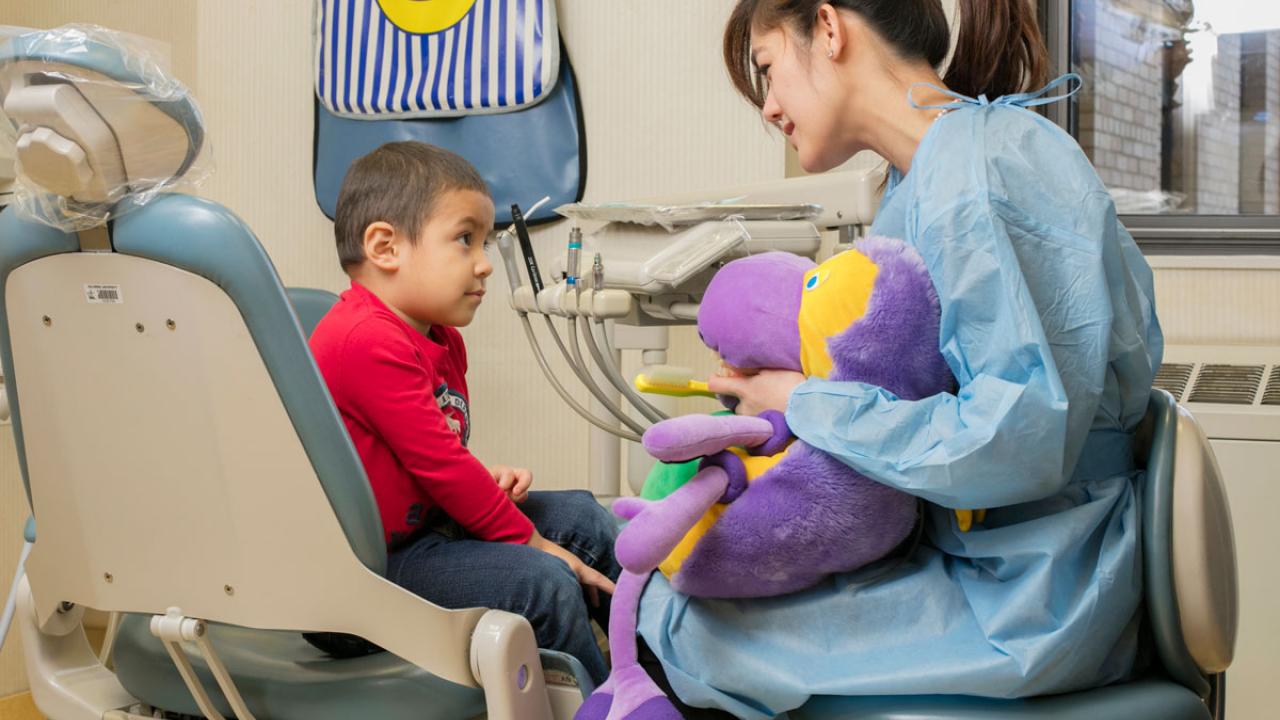Finest Pediatric Dentist Oakland for Your Child's Dental Needs
Wiki Article
Safety Net in Pediatric Dental Care: Promoting Healthy Practices for Stronger Teeth and Better Smiles
In the world of pediatric dental care, promoting safety nets plays a crucial duty in cultivating a foundation for lifelong dental health and wellness. As youngsters's teeth are susceptible to degeneration and numerous dental concerns, instilling healthy behaviors from a very early age is extremely important. From the value of regular oral visits to effective oral health methods and the function of fluoride in preventive care, there exist essential approaches that can considerably impact a youngster's dental health. kid dentist near me. The journey to advertising stronger teeth and brighter smiles expands beyond these essential methods. Remain tuned to find exactly how an all natural strategy to pediatric oral treatment can pave the method for a life time of optimal oral wellness.Relevance of Very Early Oral Sees
Early oral sees play a vital function in developing a structure for ideal dental health and wellness in kids. Presenting kids to the dentist at an early age not just helps to prevent dental problems however likewise fosters a favorable mindset in the direction of oral care. The American Academy of Pediatric Dental care suggests that a youngster needs to have their very first oral browse through by the age of one or within six months of the eruption of their first tooth. These early gos to allow dental professionals to check the development and development of the kid's teeth, determine any kind of possible problems, and give assistance on appropriate oral hygiene techniques.Moreover, early oral sees aid to acquaint children with the dental atmosphere, minimizing anxiety and worry connected with oral appointments in the future - children dentistry oakland. By establishing an oral home early, moms and dads can access beneficial information on nourishment, fluoride usage, and preventive like ensure their child's teeth stay healthy and balanced and solid. Overall, early oral gos to are essential in promoting great oral wellness behaviors and stopping dental troubles in kids

Efficient Dental Hygiene Practices
What are the crucial concepts behind keeping effective dental health methods for pediatric oral care? Developing good oral hygiene behaviors from a young age is important for preventing dental problems in kids. Brushing teeth a minimum of twice a day making use of fluoride tooth paste is basic. Parents should help their youngsters in cleaning until they can do it properly on their own, generally around the age of 6 or 7. Flossing should additionally be integrated into the daily routine to eliminate food fragments and plaque between teeth. Furthermore, routine oral check-ups every 6 months are important to keep an eye on oral health and wellness and resolve any type of concerns early. Urging a well balanced diet plan reduced in sugary snacks and beverages further advertises healthy teeth. Restricting sweet treats to nourishments can help in reducing the danger of tooth cavities. Instructing youngsters the value of oral hygiene through positive reinforcement and leading by instance establishes the foundation for a lifetime of good oral habits and makes certain brighter smiles for years to find.Duty of Fluoride in Preventive Treatment
In the realm of pediatric dental care, the incorporation of fluoride plays a pivotal duty in safety nets targeted at preserving optimal oral health and wellness. Fluoride is a naturally occurring mineral that aids protect against dental caries by making the enamel extra resistant to acid assaults from plaque bacteria and sugars in the mouth. When youngsters are subjected to fluoride with resources like fluoridated water, toothpaste, or professional treatments, it can reinforce their teeth and avoid tooth cavities.The advantages of fluoride in preventive care extend beyond simply children; it is a fundamental part in promoting dental wellness for individuals of every ages. Neighborhood water fluoridation, particularly, has been acknowledged as one this contact form of one of the most efficient public health and wellness steps for avoiding oral decays. By incorporating fluoride into normal dental care routines, both at home and properly, moms and dads and caretakers can help make certain that children develop solid and healthy teeth that will last a lifetime.
Nourishment Tips for Dental Wellness

Encouraging Positive Oral Routines
To additionally reinforce the structure of great oral health developed through well balanced nourishment, instilling positive oral routines in children is a vital part of pediatric dentistry. Urging youngsters to brush their teeth at the very least twice a day for 2 mins each time is vital. Parents should manage cleaning up until the child can successfully comb by themselves, usually around the age of 6 or 7. Making use of fluoride tooth paste in the appropriate quantity helps reinforce enamel and avoid dental caries. Flossing should additionally be introduced as quickly as there are 2 teeth touching each other reference to stop plaque accumulation in those areas. Normal dental check-ups every six months assist in very early detection of any kind of dental problems and advertise a positive mindset in the direction of dental gos to. Restricting sweet snacks and drinks, specifically before bedtime, can substantially decrease the danger of dental caries. By establishing these positive dental behaviors early on, kids can keep solid teeth and bright smiles for many years to find.Final Thought
In verdict, very early oral visits, efficient dental health practices, fluoride usage, correct nutrition, and favorable oral routines play essential roles in Read Full Report promoting pediatric oral wellness. kid dentist near me. By integrating these precautionary actions right into day-to-day regimens, kids can develop healthier teeth and brighter smiles for a life time. It is crucial for moms and dads, caregivers, and healthcare providers to collaborate in promoting these practices to guarantee optimal oral health outcomes in youngstersReport this wiki page